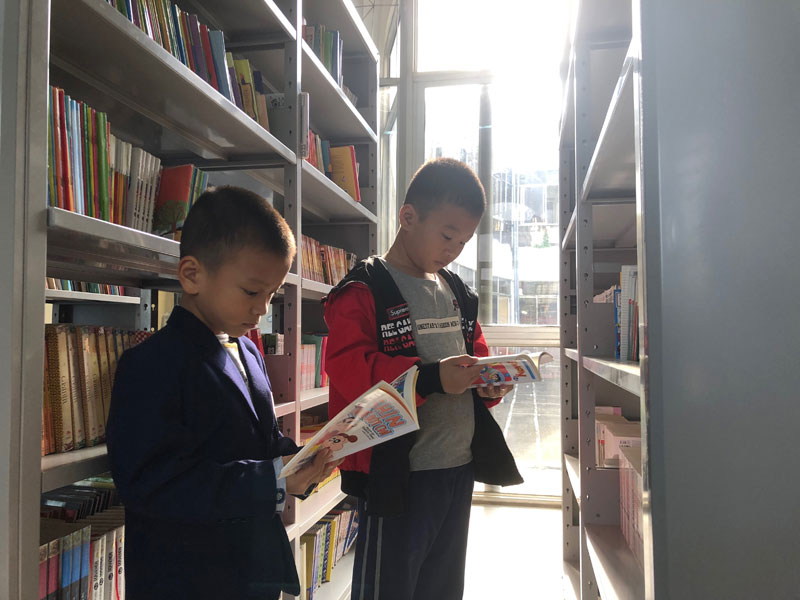
(HBO) – After two years of implementing a project developing reading culture in community through 2020, with a vision towards 2030, 80 percent of students, 25 percent of locals in rural areas, and 20 percent of residents in disadvantaged areas in the northern province of Hoa Binh have been able to access information at public libraries, while all education facilities have libraries with suitable materials.
 Students in Hoa Binh city regularly go to library to read
books.
Students in Hoa Binh city regularly go to library to read
books.
Over the past time, reading culture has been
promoted among people, especially youths, students and locals in remote areas.
The development of reading culture contributes to improving public knowledge,
promoting creativity, and enhancing awareness of law observance, thus forming a
healthy lifestyle in the community, and building a learning society.
The quality of community library system has been
constantly improved to meet the reading demand of people. Since 2018, the provincial
library has supplemented 1,645 books and 34 newspapers and magazines, while
providing 12,000 free reading cards, serving 133,400 readers. More than 890,000
readers have accessed the website of the provincial library.
In 2019, localities and agencies across the
province have stepped up life-long learning activities in libraries, museums,
cultural houses, and reading culture development clubs in community.
The provincial Department of Culture, Sports
and Tourism has coordinated with the provincial Department of Education and
Training to sign a programme to improve the State management on library and
intensify education and life-long learning activities in libraries in
2019-2020.
The Department of Culture, Sports and Tourism
has successfully hosted the book and reading culture festival in
2019 in Tan Lac district, drawing over 10,000 visitors.
The provincial library has also worked with the
centre for culture and cinema to provide books for people in 22 communes of Ky
Son, Luong Son, Lac Thuy, Yen Thuy, Lac Son, Kim Boi, Da Bac, Cao Phong, and
Tan Lac districts, attracting 44,000 participants.
It also presented more than 1,000 books worth
over 100 million VND to 19 communes across the province.
Bui Van Dip, director of the provincial library,
said the local public library system has been developed from the grassroots to
provincial level, helping promote reading culture in community./.
The Department of Education and Training of Hoa Binh province held a conference on March 18 to review the performance of the "Safe and Happy School" Project and set out tasks for 2025. The project, funded by the Taiwan Fund for Children and Families (TFCF), aims to create a safe, inclusive, and supportive learning environment for students. The event saw the attendance of representatives from the TFCF and 26 beneficiary schools.
With over 70% of their workers being women, trade unions across industrial parks (IPs) in Hoa Binh have been actively safeguarding their legal rights and interests while implementing initiatives to improve their income and well-being.
In recent years, the Hoa Binh provincial General Hospital has continuously innovated itself and improved the quality of medical services to meet the increasing needs of local people. With substantial investments in infrastructure and modern equipment, along with a team of highly qualified doctors and nurses, the hospital has gradually established itself as one of the leading medical units in the Northwestern region and a trusted destination for healthcare for people inside and outside the province.
From mastering the fundamentals of programming to achieving national recognition, the Programming Club of the Le Van Tam Primary School (STAR LVT28) in Hoa Binh city has made remarkable strides in the field of robotics.
The Ho Chi Minh Communist Youth Union Committee and the Vietnam Youth Federation chapter of Hoa Binh province organised a programme on March 12 to launch the "Digital Literacy" movement and an online quiz on the resolutions of the Vietnam Youth Federation congresses at all levels, as well as the Politburo's Resolution No. 57-NQ/TW on breakthroughs in the development of science, technology, innovation, and national digital transformation.
As climate change grows more unpredictable, the development of production forests has become essential - not just for economic growth, but for safeguarding the environment and maintaining ecosystem balance. By boosting local incomes, curbing natural disasters, preventing soil erosion, and protecting water resources, these forests play a crucial role in sustainable development.



 Students in Hoa Binh city regularly go to library to read
books.
Students in Hoa Binh city regularly go to library to read
books.